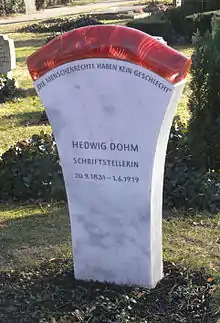Hedwig Dohm
Marianne Adelaide Hedwig Dohm (née Schlesinger, later Schleh; 20 September 1831 – 1 June 1919) was a German feminist and author. She was one of the first feminist thinkers to see gender roles as a result of socialization and not biological determinism.
| Hedwig Dohm | |
|---|---|
 Hedwig Dohm, c. 1898 | |
| Born | Marianne Adelaide Hedwig Schlesinger September 20, 1831 Berlin |
| Died | June 1, 1919 (aged 87) Berlin |
| Resting place | Alter St.-Matthäus-Kirchhof |
Family
She was born in the Prussian capital Berlin to assimilated Jewish parents, and her father was baptized.[1][2][3] The third child of (Henriette) Wilhelmine Jülich, née Beru and tobacco manufacturer Gustav Adolph Gotthold Schlesinger (originally Elchanan Cohen Schlesinger). Her father had converted to Protestantism in 1817; in 1851 he adopted the surname Schleh. Hedwig's parents did not marry until 1838, as her father's family had strong reservations about this marital union.
While her brothers were enabled to attend the Gymnasium, Hedwig had to leave school at the age of 15, to help out with household chores. Three years later, she began an apprenticeship at a teaching seminary.
In 1853 she became the wife of writer and actor Ernst Dohm (Elias Levy; 1819–1883), editor-in-chief of the Kladderadatsch satirical magazine, with whom she had five children:
- Hans Ernst (1854–1866), the only son
- Gertrude Hedwig Anna (1855–1942), married the mathematician Alfred Pringsheim (1850–1941)
- Ida Marie Elisabeth "Else" (1856–1922)
- Marie Pauline Adelheid (1858–?)
- Eva (1859–?)
By her daughter Gertrude Hedwig, she became grandmother of Katharina "Katia" Pringsheim (1883–1980), the wife of Thomas Mann, and of the musician Klaus Pringsheim, Sr. (1883–1972). Bt another daughter, Marie Pauline Adelheid, she became grandmother of Hedda Korsch, a communist activist and educationalist who married Karl Korsch.
Life
Hedwig and her husband associated with the intellectual circles in Berlin, the future German capital. In 1867 she published her first study, on the historical development of Spanish national literature, based on the knowledge she had taught herself on an autodidactic basis. From the early 1870s onwards, she published feminist treatises demanding legal, social and economic equality, as well as women's suffrage. These essays made her popular but also encountered opposition by moderate feminists who merely concentrated on better educational opportunities for young women. In the late 1870s, Hedwig wrote several theatre comedies that were all performed at the Berlin Schauspielhaus with considerable success.
After her husband died in 1883, she began to write novels, until from the late 1880s she again published numerous treatises on the revived feminist movement. Hedwig Dohm also founded the Reform association advocating a comprehensive educational reform and female university studies. She joined the Women's Welfare (Frauenwohl) association founded by Minna Cauer as well as Helene Stöcker's League for the Protection of Mothers (Bund für Mutterschutz). Her polished style mocking male claims to power, as well as her professed disrespect for the patriarchal social system broke new grounds in her day.

Hedwig Dohm was one of the few German intellectuals to publicly speak out against the patriotic fever on the eve of World War I, publishing pacifist articles in the left-wing journal Die Aktion edited by Franz Pfemfert. She lived to see the implementation of women's suffrage in the Weimar Republic after the German Revolution of 1918–19.
Hedwig Dohm died in Berlin at the age of 87. She is buried in the Alter St.-Matthäus-Kirchhof in the Schöneberg district.
Literary works
- Was die Pastoren von den Frauen denken, 1872
- Der Jesuitismus im Hausstande, 1873
- Die wissenschaftliche Emanzipation der Frau, 1874
- Der Frauen Natur und Recht, 1876
- Die Antifeministen. Ein Buch der Verteidigung, 1902
- Die Mütter. Ein Beitrag zur Erziehungsfrage, 1903
- Der Mißbrauch des Todes, 1915
Literature
- Werde die du bist. Wie Frauen werden, 2 novels 1894
- Sibilla Dalmar, 1896
- Schicksale einer Seele, 1899
- Christa Ruland, 1902
Literary references
- Nikola Müller und Isabel Rohner (Hg.): Hedwig Dohm - Ausgewählte Texte. Berlin: trafo Verlag, 2006. ISBN 3-89626-559-8
References
- "Dohm, Hedwig (1831–1919) | Encyclopedia.com". www.encyclopedia.com. Retrieved 2020-12-18.
- Literary Encyclopedia: Hedwig Dohm
- "Dohm, Hedwig | Encyclopedia.com". www.encyclopedia.com. Retrieved 2020-12-18.
External links
| Wikiquote has quotations related to: Hedwig Dohm |
- Works by or about Hedwig Dohm at Internet Archive
- Works by Hedwig Dohm at LibriVox (public domain audiobooks)

- Eine Homepage rund um Hedwig Dohm
- Dohms Werke beim Projekt Gutenberg
- Biografie in der Berlinischen Monatsschrift
- Satirische Auseinandersetzung mit Georg Groddecks These, dass Frauen keine Persönlichkeit hätten
- GHDI - Document at germanhistorydocs.ghi-dc.org Hedwig Dohm's Essay "What the Pastors Think of Women" (1872)
- GHDI - Document at germanhistorydocs.ghi-dc.org Hedwig Dohm's Essay, "Women's Right to Vote" (1876)